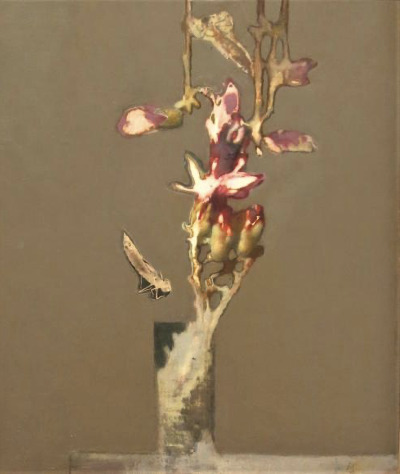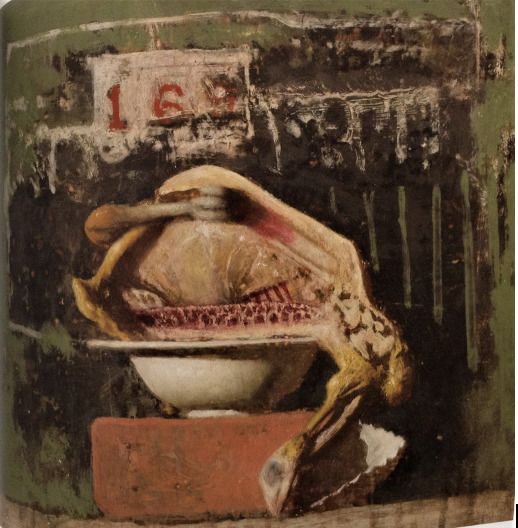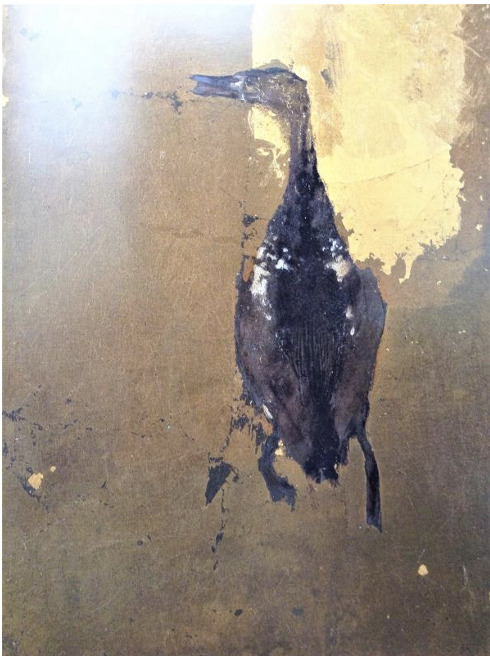#bagleywrightlectureseries
Explore tagged Tumblr posts
Text



These images, Magnolia and Damsel Fly Nymphs (1979), Still Life with Chicken (1992), and Duck (1977), all by Bruce Kurland, are presented in accompaniment with Isaac (formerly Lisa) Jarnot's lecture, "Abandon the Creeping Meatball: an Anarcho-Spiritual Treatise," now available to listen to via the BWLS podcast.
0 notes
Text
Like Someone in Love: Late Night Thoughts for David Meltzer, by Cedar Sigo

\\
Presenting *Star Time* David Meltzer
and the Famous Flames, lovely healer and
hologram, avenger of the blood who could
read for hours when the children’s faces
followed him upstairs, the dog would bark
The fire spit funerary songs
A smoke of tiny feathers
that we know nothing and gladly say so (smiling)
that a prince is sometimes left to trace and dig and paste
asking after my poems, qualities of transmission
and who had I been listening to? I might say
Lady or The Misty Miss Christy
Carmen meaning McCrae or Leontyne
Price, either way, he was always
right there and shot through,
wide wreath in flames
\\
What I seemed to have in common with David Meltzer was a deep love of the American Songbook meaning Cole Porter, Duke Ellington, Johnny Mercer, Harold Arlen, Irving Berlin, Gershwin of course and within that cosmos our old engraved jewels of songs, personal favorites which we would indicate to each other over time. We would discuss how That’s All as sung by June Christy is in fact an entirely different song after Dinah Washington gets inside of it, whether live on stage or within the studio. It is the same with poets, we are constantly turned on by and so rewriting each other’s changes. The lyrics from this collective American Songbook were just as smooth and collapsible as the ghost of the melody and would provoke (hopefully) a long chase through the night.
“Smoking, drinking, never thinking/ of tomorrow/ nonchalant/ diamonds shining/ dancing, dining/ with some man in a restaurant/ is that all you really want?” – Billy Strayhorn
I think David could sense that I knew both the music and lyrics by heart and also where they might need to break apart, time and time again. His charming patter between poems was always the first thing I flashed on the morning after his readings. Proof that you could really be yourself on stage was extremely helpful. Performance can become so deluded when you think you are setting up a clever trap for the audience in advance of your voice. But there were no tricks like this needed with David. He played his tune, cuing us all slightly as to when it might change. He would attempt to connect that space between lines and let you hang there, it was mostly about making the reading a multidimensional experience. It was like gathering to hear winter stories in the long-house. There was something shamanistic about him, a word which has almost been drained of its ceremonial urgency. The mere memory of David helps to restore its meaning actually.
\\
We never studied together formally, looking back now, that is one of the few regrets of my life. I would always hand off extra copies of my early books to Micah Ballard each inscribed in advance to Meltzer. Of all of the ‘Bolinas’ poets that moved in and out of New College in the early 2000s David seemed to me the most ageless, possessed of a glimmering youth that went beyond body, a purely physic space. How remarkable that he would meet us on equal ground time and time again, even after years of encountering thirsty poets.
Micah and I once hung a tiny show of David’s collages at the Lew Gallery, which doubled as Micah’s office just off of Valencia St. We would unscrew the office door from its hinges to indicate when this transformation had occurred. The door itself was a wonderful welcoming work. I remember at David’s opening that we smoked hash while sliding further down upon the cool tile floors and through it all David’s voice right there, coaching us while also allowing for bliss.
\\
I always loved that one of his later pamphlets was titled Stuntman. He had the best way of kidding himself, somewhat ruthlessly but always bringing down the house around him. He would give almost anything for a laugh, an easy way out. Someone needs to put his chronology down for poets of the future to study and enjoy. His story moves from NY to LA to SF to Bolinas to England to Richmond, then of course each individual collection of poems has a bundle of stories attached. He was also a great editor of anthologies on Birth, Death, Jazz, The Kabbalah. I am also dying to get my hands on more issues of Tree, his alchemical magazine and press. This is only a glossing, a smash and grab from the several arcs within his story.
\\
The Dark Continent
Ragas
Semina VI (the clown)
“the Center
Peg of Circus
with Barnum’s elephants
& Ringling’s floats. A matter of mask &
instant. There are no statues
of clowns.”
A million Selected Poems
Six, Arrows, Tens?
David’s Copy
which always
came inscribed
with the marble
faces of gods
\\
On the day David passed I was writing a short introduction for a limited-edition Selected Works with the artist Frank Haines. Rereading it now the intro was clearly an occasion to write through the mythic qualities of David’s life, the particles left charged in his poems as well as his affection for teachers like Robert Duncan. I will close with the last paragraph from that piece:
“I try and find new ways of brooking the rush until it begins to flow. The lines in the tide brush up against one another, they pinpoint the intrigue like a soundtrack for film, release of trap doors, the cutting of strings, no beginning or end in a realm that exists…. I can’t deny this sensation nor ever totally grasp it. The poem has its own existence.”
Cedar Sigo
0 notes
Text
The Wind at Night, by Cedar Sigo

I set out my heavy books and maps to cover the entire desk, a forthright tension pervades the room until a machine-like, unthinking fluency begins to take over, “words that come in smoke and go.”[i] Why do I push myself to constantly reconfigure the edges of my own voice? At the very instant they fall and become recognized as sounds they are quickly stamped as unearned, to be abandoned, a hanging without wall….
As a poet I want to feel surrounded by structures that I can both see through and live inside of.
This seems a result of my chronic formal restlessness, the fact that I have always placed more of a premium on outrunning my voice rather than ‘finding’ it. This is a perfect mindset for any poet who wishes to obliterate the burden of narrative.
It has often been said that over the course of their lives all poets are secretly writing a single work, whether branded as an epic or not. The interruptions of books and individual titles can barely conceal my long history of tracing architectures within language. Whichever forms of traction I can find I then subvert, certain I will never see that first construct again anyway. It was the great poet Jack Spicer that dismissed certain of his early poems as “one-night stands, filled with their own emotions, but pointing nowhere.”
The voice rises and falls and sometimes dissolves its own scaffolding. How perilous is the footing of music? I feel as though I have spent ten years building an electric organ that might cradle my voice. Tonight, I would like it to sound as though it were buried under wet sand.
“She tortures the curtains of the window, shreds them like some insane insect, creates a demented web from the thin folds, her possessed fingers clawing. She thrusts them away with sharp jabs of long pins to the walls.” – Joanne Kyger from The Maze (1957)
So much is at risk in anyone’s attempt to compose an anthem. It almost feels like an impossible task to ever consciously ‘take on.’ Last year I began to put together a composite text of lines culled from I Have Spoken: American History Through the Voices of the Indians, Indian Oratory and Great Speeches by American Indians. I would mark every line that caught my eye or ear (my heart) and eventually type it into the text. I remember adding lines of poetry to this mix as well to give it some buoyancy. These passages were obtained through random opening of a postmodern anthology. I can’t remember the exact title. This weaving of the various materials into the ‘urtext’ produced a persistent delirium for the entire three weeks of its composition. Below is a short excerpt from the initial text:
“…I shall own a book of old Chinese poems and binoculars to probe the river trees. You issued the first soldiers and we only answered back. Frogs sing in the green rushes, everywhere the same call of being to being. I was born upon the prairies where there was nothing to break the light of the sun. I want to die there and not within walls. I have not and never did have any motive of poetry but to achieve clarity. Somber clouds waver in the void. I have laid aside my lance and bow and shield. I have no little lies hidden about me. With the hair of their women to hold them back. The road clear from her body past the window glass. Are the commissioners clear as I am? The posts must be removed and the steamboats stopped. My life is buried with all sorts of passage, both down the sides and on the face turned down to earth…”
I thought that by corralling the most luminous lines into one text and then cutting it various ways I might gain the contours of a new voice, or even a literal message to be delivered. I now realize that I was seeking evidence of what Brion Gysin and William Burroughs often referred to as “the third mind.” Here is a section from the middle of the poem, currently titled “The Prisoner’s Song,”
Looking Glass is dead
The circular blue paper is the sky
We see some green spots which are pleasing
Are the commissioners clear as I am?
I gave them a blue flag which they pretended to cherish
I live in hopes. I do not have two hearts
The Illinois River will rise
A single warrior to write beyond without me
Death at the hands of the long guns
Did I say death? Or the springs are drying up?
Find the break where blood runs clear
Through the love you bear your gallant little band
Writing this poem felt like fiddling with the knobs of an old crackling car radio until its wires suddenly crossed to connect me with the dead. It felt as if its signal could only come alive within the desert of west Texas where I was then writing. All kinds of edges and tailoring of the line would emerge. The only way out was literally through the raw text. I cut and rearranged until I felt I had uncovered every change in every possible key. I had successfully destroyed my own instrument. Near the end of this work I included a quote from Joy Harjo that seemed to speak directly to the scope of its process, “Not to reverse history, but to draw out the strength.”
In this current, sickening political climate I have come to think of every poet as a wayward soldier who at some point will function as a prophet, degraded crown and all. I often think of Amiri Baraka’s clarity in reminding us that misfortune often arises when we stop struggling.
Cedar Sigo
[i] from Notes for Echo Lake by Michael Palmer (North Point Press, 1981)
0 notes